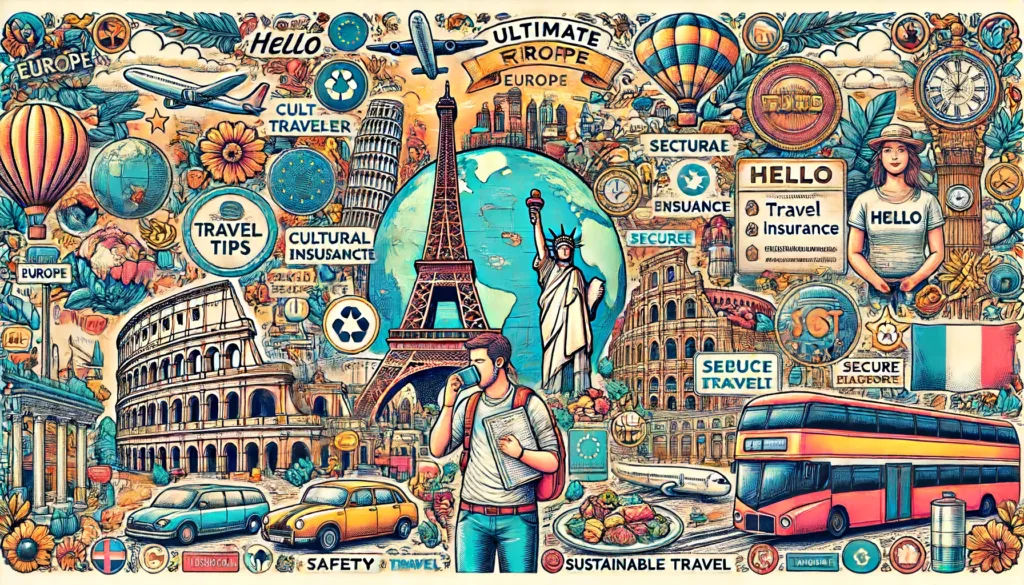
Your Ultimate Travel Guide
Exploring Europe is a dream for many travelers, with its rich history, diverse cultures, and stunning landscapes. Whether you’re planning a backpacking trip through multiple countries or a relaxing vacation in one city, these tips will help you make the most of your European adventure.
Your Ultimate Travel Guide
1. Best Time to Visit
Europe is a year-round destination, but the best time to visit depends on your interests:
- Spring (April to June): Pleasant weather, fewer tourists, and blooming flowers make this a great time for sightseeing.
- Summer (July to August): Ideal for beach holidays and festivals, but expect larger crowds and higher prices.
- Autumn (September to October): Mild weather, beautiful fall foliage, and fewer tourists.
- Winter (November to March): Perfect for skiing in the Alps or experiencing Christmas markets, but pack warm clothes.
Your Ultimate Travel Guide
2. Packing Essentials
- Versatile Clothing: Pack layers to adjust to varying climates. A mix of casual and semi-formal attire is recommended.
- Comfortable Shoes: You’ll do a lot of walking, so bring sturdy, comfortable footwear.
- Travel Adapters: Europe has different plug types (Type C, E, and F are common). A universal adapter is useful.
- Daypack: A small backpack for daily excursions.
- Reusable Water Bottle: Stay hydrated while being eco-friendly.
Your Ultimate Travel Guide
3. Getting Around
- Trains: Europe’s extensive train network is ideal for travel between cities and countries. Consider a Eurail pass for flexibility.
- Buses: Budget-friendly options like FlixBus and Eurolines connect major cities.
- Flights: Low-cost airlines like Ryanair and EasyJet offer cheap flights between European destinations.
- Public Transport: Cities have efficient metro, tram, and bus systems. Buy day passes for convenience.
- Biking: Many European cities are bike-friendly, with dedicated lanes and bike-sharing programs.
Your Ultimate Travel Guide
4. Must-Visit Destinations
- Paris, France: The city of love, known for the Eiffel Tower, Louvre Museum, and charming cafes.
- Rome, Italy: Explore ancient history with the Colosseum, Vatican City, and delicious Italian cuisine.
- Barcelona, Spain: Famous for Gaudí’s architecture, vibrant nightlife, and beautiful beaches.
- Amsterdam, Netherlands: Enjoy picturesque canals, museums, and a relaxed atmosphere.
- Berlin, Germany: A city with a rich history, eclectic nightlife, and diverse culture.
- Prague, Czech Republic: Known for its medieval architecture, charming old town, and historic castles.
Your Ultimate Travel Guide
5. Cultural Etiquette
- Greetings: Learn basic greetings in the local language. A simple “bonjour” (French) or “hola” (Spanish) goes a long way.
- Dining: Table manners vary, but tipping around 10% is generally appreciated.
- Respect Local Customs: Be mindful of cultural norms, such as dress codes for churches and temples.
- Public Behavior: Europeans value politeness and quiet in public spaces. Keep noise levels down, especially on public transport.
Your Ultimate Travel Guide
6. Food and Drink
- Local Cuisine: Try regional specialties, from Italian pasta and French pastries to Spanish tapas and Greek gyros.
- Street Food: Don’t miss out on local street food for a quick and delicious meal.
- Water: Tap water is safe to drink in most European countries, but always double-check.
- Alcohol: Enjoy local wines and beers, but be aware of public drinking laws.
Your Ultimate Travel Guide
7. Health and Safety
- Travel Insurance: Essential for covering unexpected medical expenses, trip cancellations, or lost belongings.
- Emergency Numbers: 112 is the emergency number across the EU.
- Vaccinations: Ensure you are up-to-date on routine vaccines.
- Safety Precautions: Be mindful of pickpockets, especially in crowded tourist areas. Keep valuables secure.
8. Money Matters
- Currency: The Euro (€) is used in many countries, but others like the UK (Pound Sterling) and Switzerland (Swiss Franc) have their own currencies.
- ATMs and Cards: Widely available, and credit/debit cards are accepted in most places.
- Budgeting: Europe can be expensive, but budgeting and choosing off-peak travel times can help save money.
9. Sustainable Travel
- Reduce Plastic Use: Bring a reusable water bottle and bags.
- Public Transport: Opt for trains and buses over flights for shorter distances.
- Support Local: Shop at local markets and stay in locally-owned accommodations.
Conclusion
Europe is a diverse and captivating continent with something for every traveler. By following these tips, you’ll be well-prepared to enjoy a smooth, enjoyable, and memorable European adventure. Happy travels!
Other External Resources
Related Topic
/https://blog.peart.one/ultimate-travel-guide-essential-tips-for-exploring-thailand/